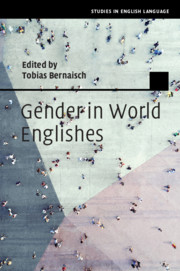Book contents
- Gender in World Englishes
- Studies in English Language
- Gender in World Englishes
- Copyright page
- Dedication
- Contents
- Figures
- Tables
- Contributors
- Chapter 1 Introduction
- Chapter 2 Localisation, Globalisation and Gender in Discourse-Pragmatic Variation in Ghanaian English
- Chapter 3 Sociolinguistic Variation in Intensifier Usage in Indian and British English
- Chapter 4 Tag Questions and Gender in Indian English
- Chapter 5 Hedges and Gender in the Inner and Expanding Circle
- Chapter 6 The Role of Gender in Postcolonial Syntactic Choice-Making
- Chapter 7 Social Constraints on Syntactic Variation
- Chapter 8 Linguistic Colloquialisation, Democratisation and Gender in Asian Englishes
- Chapter 9 Gender, Writing and Editing in South African Englishes
- Index
- References
Chapter 6 - The Role of Gender in Postcolonial Syntactic Choice-Making
Evidence from the Genitive Alternation in British and Sri Lankan English
Published online by Cambridge University Press: 11 December 2020
- Gender in World Englishes
- Studies in English Language
- Gender in World Englishes
- Copyright page
- Dedication
- Contents
- Figures
- Tables
- Contributors
- Chapter 1 Introduction
- Chapter 2 Localisation, Globalisation and Gender in Discourse-Pragmatic Variation in Ghanaian English
- Chapter 3 Sociolinguistic Variation in Intensifier Usage in Indian and British English
- Chapter 4 Tag Questions and Gender in Indian English
- Chapter 5 Hedges and Gender in the Inner and Expanding Circle
- Chapter 6 The Role of Gender in Postcolonial Syntactic Choice-Making
- Chapter 7 Social Constraints on Syntactic Variation
- Chapter 8 Linguistic Colloquialisation, Democratisation and Gender in Asian Englishes
- Chapter 9 Gender, Writing and Editing in South African Englishes
- Index
- References
Summary
This paper studies the genitive alternation in British English and Sri Lankan English on the basis of more than 4,000 annotated cases of of- and s-genitives from the British and Sri Lankan components of the International Corpus of English. Specifically, we explore the effects of a variety of language-internal and language-external effects, focusing in particular on how these factors affect genitive choices both on their own, but also in interaction with each other and, a first in this kind of variety research, with the gender of the speakers. Our results corroborate previous findings regarding the language-internal factors, but we also obtain a variety of statistical effects representing interactions of those with variety and gender: for instance, animacy effects are stronger in Sri Lankan English, but animacy and length/weight effects are moderated by speaker gender; we discuss these and other findings with regard to processing, language contact and gender (in-)equality. Methodologically, we are developing two innovations for variationist research, namely a principled way to identify and then also visualise the effect of interactions in random forests.
Keywords
- Type
- Chapter
- Information
- Gender in World Englishes , pp. 121 - 146Publisher: Cambridge University PressPrint publication year: 2021

